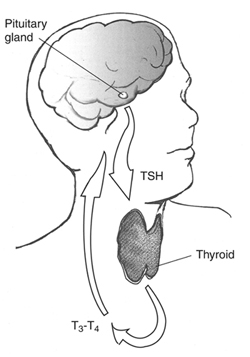
Photo:Christopher Klose
The thyroid is a butterfly-shaped endocrine gland in your neck. It makes hormones that help regulate metabolism—how the body uses energy from the foods you eat. These hormones also affect brain development, breathing, heart and nervous system functions, body temperature, muscle strength, skin dryness, menstrual cycles, weight, and cholesterol levels.
Claudine Klose has hypothyroidism. But if it weren't for her doctor, she'd never know it. Like millions of other Americans, mostly women, she has never had any of the symptoms associated with this very common, controllable condition. "During my annual physical exam three years ago, my doctor noticed that my thyroid gland was a bit enlarged. The subsequent blood test showed that my thyroid hormone levels were too low," recalls the 60-year old sheep and hay farmer. "A second blood test six weeks later confirmed hypothyroidism. Ever since, I've taken a low-dosage synthetic hormone every morning—and will for the rest of my life. I feel fine, thanks to my doctor. It's very important to have an annual physical, and to have your health professional check your thyroid levels."
Millions of people in the U.S., mostly women, have thyroid diseases. If your thyroid does not make enough thyroid hormone, you have hypothyroidism, the most common thyroid condition. You can gain weight, feel tired, and have difficulty dealing with cold temperatures. If your thyroid makes too much thyroid hormone, you have hyperthyroidism. You can lose weight, have a more rapid heart rate, and be very sensitive to heat.

The Thyroid gland's production of thyroid
hormones is triggered by thyroid-stimulating
hormone (TSH),
which is made by the
pituitary gland.
What is hypothyroidism?
Hypothyroidism is a condition in which the thyroid gland does not produce enough hormones to meet the body's needs. Body functions slow. Of the U.S. population 12 years and older, 4.6 percent have hypothyroidism. Women are much more prone to it than men.
What causes hypothyroidism?
Hypothyroidism has several causes:
Hashimoto's Disease
Also called chronic lymphocytic thyroiditis, Hashimoto's disease is an autoimmune disorder that leads to less hormone production. It is the most common cause of hypothyroidism in the U.S.
Thyroiditis
Thyroiditis is an inflammation of the thyroid gland. The thyroid leaks hormones into the bloodstream. At first, this raises hormone levels and leads to hyperthyroidism lasting a month or two. Then, before the thyroid is completely healed, most people develop hypothyroidism.
Congenital Hypothyroidism
Some babies are born with a thyroid that is not fully developed or does not work properly. This can lead to mental retardation and growth failure. Most U.S. newborns are screened for hypothyroidism. Early treatment can prevent complications.
Who is likely to develop hypothyroidism?
Women are much more likely than men to develop hypothyroidism. It is also more common among people over 60. Because hypothyroidism develops slowly, many people don't notice symptoms of the disease. Regular testing is recommended if people have:
- had a previous thyroid problem, such as a goiter or thyroid surgery
- a family history of thyroid disease
- other autoimmune diseases, including Sjögren's syndrome, pernicious anemia, type 1 diabetes, rheumatoid arthritis, or lupus
- Turner syndrome, a genetic disorder of girls and women
- turned older than 60
- been pregnant or given birth within the past six months
- received radiation to the thyroid, neck, or chest
Fast Facts
- Hypothyroidism occurs when the thyroid gland does not produce enough hormones, which regulate metabolism. Many of the body's functions slow down.
- Hypothyroidism is mostly caused by Hashimoto's disease, an autoimmune disorder. It affects women more often than men. Other causes include inflammation of the thyroid gland, treatments for hyperthyroidism or other thyroid problems, and certain medications.
- Some hypothyroid symptoms are fatigue, weight gain, cold intolerance, constipation, impaired fertility, and depression.
- Hypothyroidism is easily controlled with synthetic thyroid hormone.
Treatments that may lead to hypothyroidism
Thyroid Surgery
Surgery to remove all or part of the thyroid is used to treat:
- hyperthyroidism, when too much thyroid hormone is produced
- an enlarged thyroid gland (goiter) that may cause the neck to appear swollen and can interfere with normal breathing and swallowing
- thyroid nodules (lumps in the thyroid gland)
- thyroid cancer
After partial removal, the thyroid may produce normal hormone levels. But some people still will develop hypothyroidism. Complete removal always results in hypothyroidism.
Radiation
Radioactive iodine, a common treatment for hyperthyroidism, gradually destroys the thyroid. Almost everyone who receives this treatment eventually develops hypothyroidism. Radiation for Hodgkin's disease, other lymphomas, and head or neck cancers can also damage the thyroid.
Medications
Some drugs that can lead to hypothyroidism include:
- amiodarone, a heart medication
- interferon alpha, a cancer medication
- lithium, a bipolar disorder medication
- interleukin-2, another cancer medication
Less commonly, too much or too little iodine in the diet or abnormalities of the pituitary gland cause hypothyroidism.
Pregnancy
Women can have hypothyroidism in early pregnancy and after delivery, even when they have never had thyroid problems. Women who normally take thyroid hormone may need more at these times. Untreated hypothyroidism can cause serious problems for the mother and baby.
Postpartum thyroiditis occurs in up to 10 percent of women in the first year after giving birth. It is painless and believed to be an autoimmune condition. Sometimes postpartum thyroiditis goes undiagnosed because it is mistaken for the exhaustion and moodiness that can follow delivery. In some women, the thyroid does not heal and hypothyroidism becomes permanent.
